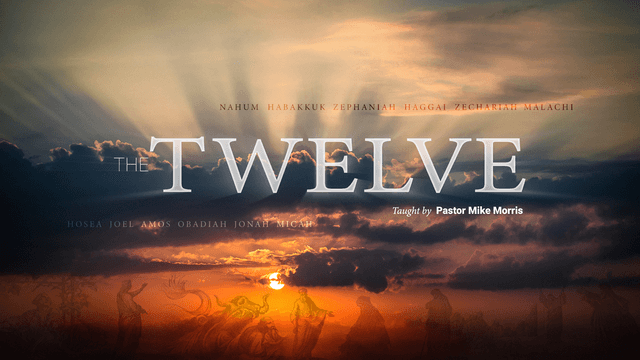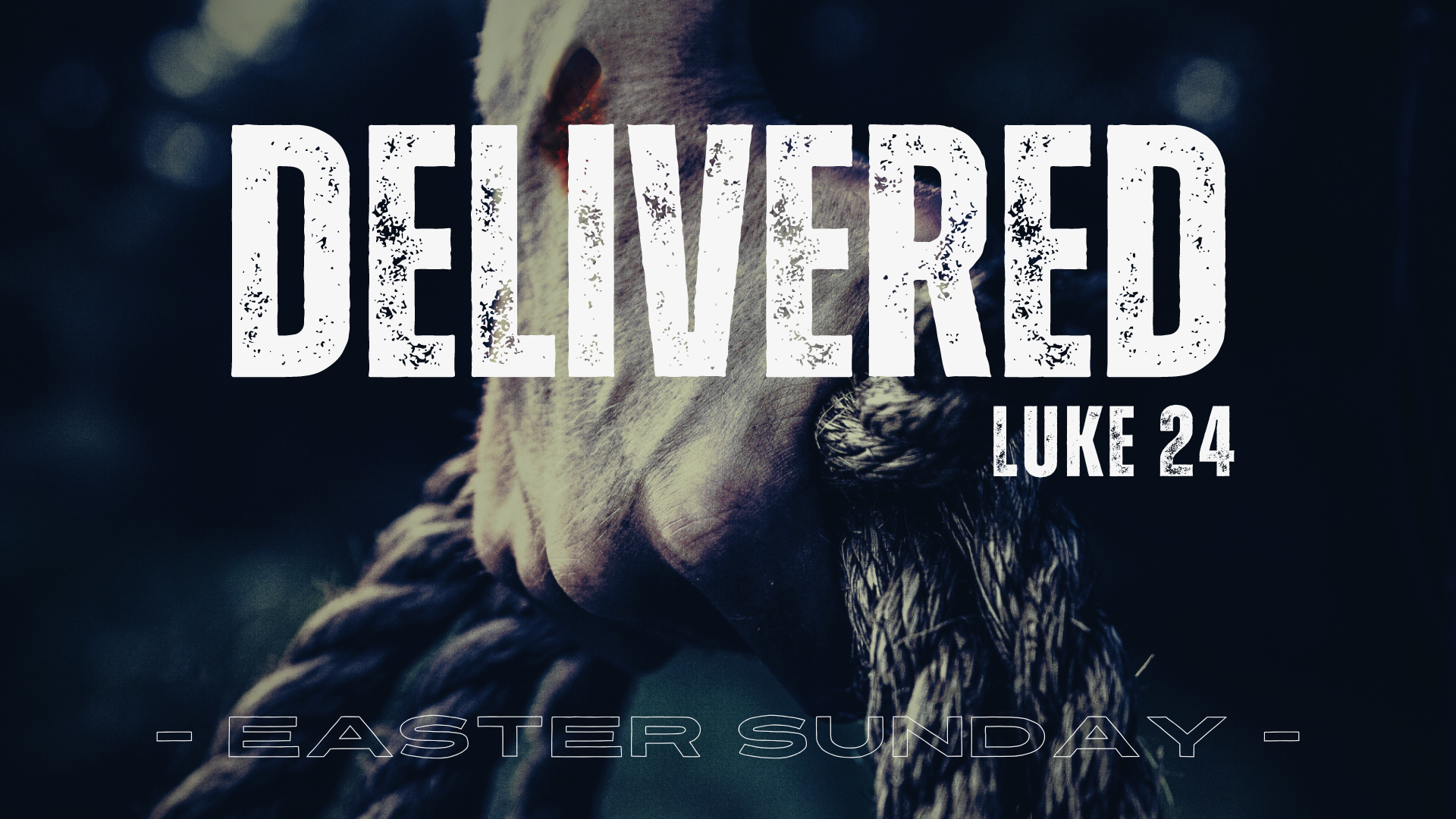Sunday Service 9am & 11am
Wednesday Service 7pm
(210) 920-6502
551 E Nakoma St.
San Antonio, TX 78216
Join a small group to study this sermon with like-minded believers.
Joel 3:28-32
LISTEN. STUDY. APPLY
Video
Audio
Manuscript
Welcome back to our study of the Twelve, the ancient Hebrew name for the Old Testament books that we call the minor prophets. The last twelve books in your Old Testament.
Today we continue our study of the short book of the prophet Joel and as we always do here at VBVF, we are careful to consider the background and context of a biblical book. this is our ninth book in this series. so let’s set the prophet Joel in the context of The Twelve.
Let’s look at the timelines of the two Israelite nations in the time of the divided monarchy, Israel in the north and Judah in the south.
The voices of the prophets ceased in the north as the Assyrians crushed Israel, taking them into captivity in 722 BC, an exile from which they never returned.
Judah endured another 135 years before falling to the Babylonians, the nation that conquered the Assyrians. our studies of Jonah through the beginning of Joel are available on our website, vbvf.org, under the “Old Testament” tile. look for the series entitled “The Twelve”
In addition to the historical setting, let’s review some other important features.
Author: the author of the book is Joel, which means “The Lord is God”.
Date/Historical Setting: the date that seems to fit the context and content of the book is very close to the Babylonian exile, probably just before or perhaps just after, sometime from about 600 BC to 500 BC.that makes Joel the final pre-exilic prophet, or the final prophet through whom God spoke just before, and just as, His people were taken into exile in Babylon. the next three – Haggai, Zechariah, and Malachi – were all written after the return of the people back to the land of Judah.
Content: as we saw last time, the book opens with a people on the brink of disaster, facing a plague of locusts; amid that disaster, Joel calls them to repentance. God finally speaks in 2.12. “Yet even now,” declares the Lord, “return to me with all your heart, with fasting, with weeping, and with mourning; and rend your hearts and not your garments.”.God promises His people restoration and blessing if they return to Him with real, not ritual, repentance. and following that implied return of the people to God, the Lord describes two blessings: one lesser, one greater. last time we covered the lesser blessing. today, we will cover the greater blessing.
Structure: There are two distinct parts of the book. the first is the descent into tragedy (1.1 – 2.17) and the second describes God’s blessing of His people, which began with the text from our last time in the book, 2.18-27, and continues today, in verses 2.28-32. then the fourth passage in the book, chapter 3, closes the prophecy with Joel’s account of the salvation of God poured out on His people and His judgment poured out on His enemies. we’ll save that for next time. though I encourage you to read ahead.
Themes: What’s this book about? Joel’s prophecy has a central focus, and it’s found in the tension between two great truths. the picture we find in this book is one of great judgment and suffering, but also one of great hope. and both the judgment and the hope are expressed in terms of the Day of the Lord. in a sense, then, the book stands as a picture of the judgment of God that even then was falling upon Judah, as they were taken into the Babylonian captivity, but also the blessing of God, as He assures His people of both material and spiritual blessings and their vindication over their enemies.
Last time, when we looked at Joel 2.18-27, we discovered what God does when He chooses to have compassion and mercy on His people. He renews them, He rescues them, He rejoices over them, He restores them, and He redeems them. now, God goes beyond those blessings and gives His best blessing, Himself, in the Person of His Holy Spirit.
These blessings were fulfilled in part for Judah as they were returned to their land and were renewed as the covenant people of God, but more importantly, the greater blessing, the outpouring of God’s own Spirit, was yet future for Judah, but for us, it is the present. we live in the days of this greater blessing, as God pours out His Spirit on all flesh.
So what are we to learn from this passage? As we work our way through these power-packed five verses and understand what the text is saying, I have four goals. first, we need to understand what this passage says. then we need to understand what it meant to those of Judah in that day. then we need to understand why and how this passage was used by the Spirit as Peter preached on the day of Pentecost in Acts 2. Then lastly, what does it mean for us today? That’s a lot to cover, so hang on tight.
Let’s read the text from Joel.
28 “And it shall come to pass afterward,
that I will pour out my Spirit on all flesh;
your sons and your daughters shall prophesy,
your old men shall dream dreams,
and your young men shall see visions.
29 Even on the male and female servants
in those days I will pour out my Spirit.
30 “And I will show wonders in the heavens and on the earth, blood and fire and columns of smoke. 31 The sun shall be turned to darkness, and the moon to blood, before the great and awesome day of the Lord comes. 32 And it shall come to pass that everyone who calls on the name of the Lord shall be saved. For in Mount Zion and in Jerusalem there shall be those who escape, as the Lord has said, and among the survivors shall be those whom the Lord calls.
So what do we see?
This passage links to the previous passage with the transitional phrase, And it shall come to pass afterward, so what’s happening here isn’t simultaneous with the blessings of the earlier part of the chapter. the rest of the first stanza, verses 28 and 29, focus on the outpouring of God’s Spirit on His people, with that promise forming an inclusio at the beginning and the end. the emphases are on the initiative of Yahweh to pour out His Spirit, His personal presence, as the greatest blessing His people could receive, and the universality of the gift, that the Spirit would be given to all flesh of Israel. old and young, men and women, masters and servants. in the second stanza, the Lord promises signs and wonders associated with the Day of the Lord. 30 “And I will show wonders in the heavens and on the earth, blood and fire and columns of smoke. 31 The sun shall be turned to darkness, and the moon to blood, before the great and awesome day of the Lord comes. What these signs are and the time of their appearance isn’t clear. they could be associated with war, in the near future or more distant future, divinely driven but related to the effects of battle. or they could be associated with the eschatological “end of days” and have a purely divine meaning. it is clear that they will be in the future, as Joel sees the vision. the third stanza offers security to those who call upon the Name of the Lord. 32 And it shall come to pass that everyone who calls on the name of the Lord shall be saved. For in Mount Zion and in Jerusalem there shall be those who escape, as the Lord has said, and among the survivors shall be those whom the Lord calls. .here the security is found in calling on the Name of the Lord, but it’s localized to Jerusalem, in Judah. again we find a very brief inclusio focused on the word “calls” – those who call on the Name of the Lord will be saved, but that group will themselves be those whom the Lord calls. the survivors of the Day of the Lord are those whom the Lord calls, and who, because of that calling, then call upon the Lord. this is a powerful passage, and it’s key to our understanding of the Day of the Lord. now let’s listen with other ears, if you will. As Joel preached this to the people of Judah, what did they think? How did they receive it?
The Promise For Judah
Most importantly, the people would have noted the universality of the greater blessing: the Spirit would be poured out on “all flesh” Write this down in your notes. Judah would have the power to receive the Spirit. the coming of the Holy Spirit includes all groups in Judean society. sons and daughters, men and women, old and young, even servants would receive and experience the greater blessing. here, Joel sees a day when all God’s covenant people as he knew them would personally know Yahweh’s Spirit. but this was limited in scope to only Israel. note the use of “your” not all humanity, nor even all God’s people.
This greater blessing for Judah would add to the brief but significant teaching on the Spirit in the OT; to the readers, it would build on the words of Ezekiel 36 and 39 and support the prophecies of Isaiah 32 and 44, and Zechariah 12, all of which speak of the pouring out of God’s Spirit on His people. Isaiah 44.2b-4 is a good example.
Fear not, O Jacob my servant,
Jeshurun whom I have chosen.
3 For I will pour water on the thirsty land,
and streams on the dry ground;
I will pour my Spirit upon your offspring,
and my blessing on your descendants.
4 They shall spring up among the grass
like willows by flowing streams.
Paul uses the same metaphor in Romans 5.5. because God's love has been poured into our hearts through the Holy Spirit who has been given to us.
Joel 2 also foretells the fulfillment of Moses’s desire in Numbers 11.29 that all God’s people would experience God’s Spirit.
Judah would tremble at the signs of the coming Day of the Lord, but they would be encouraged this time, for the Lord was coming unto the salvation of His people, not their chastisement.
But I think the prophecy would have been overshadowed by the more immediate blessings of 2.18-27 and the vindication of chapter 3, for this greater blessing shall come to pass afterward. which leads us to the next sense of this passage: Peter’s quotation of it in Acts 2. let’s examine that context.
The Promise for Pentecost
Why did Peter choose this quotation from Joel, one of the twelve?
Because, by the Holy Spirit, Peter recognized in the blessing of Pentecost the fulfillment of what Joel had prophesied here in chapter 2.” this is that” Let’s start back in Acts 1.
Peter, along with the other apostles, heard the final earthly words of Jesus, recorded in Acts 1.8. 8 But you will receive power when the Holy Spirit has come upon you, and you will be my witnesses in Jerusalem and in all Judea and Samaria, and to the end of the earth.” That’s our second point. write this in your notes. the brand-new church would have the power to evangelize in the Spirit. we see the fulfillment in the next several chapters.
So Peter knew to expect the coming of the Holy Spirit, and he knew the prophecy of Joel regarding the outpouring of God’s Spirit, and he knew it had not happened yet, but that soon, it might. now to Acts 2, beginning with verse 1.
Acts 2.1-7a, 12-21 -- When the day of Pentecost arrived, they were all together in one place. 2 And suddenly there came from heaven a sound like a mighty rushing wind, and it filled the entire house where they were sitting. 3 And divided tongues as of fire appeared to them and rested on each one of them. 4 And they were all filled with the Holy Spirit and began to speak in other tongues as the Spirit gave them utterance.
5 Now there were dwelling in Jerusalem Jews, devout men from every nation under heaven. 6 And at this sound the multitude came together, and they were bewildered, because each one was hearing them speak in his own language. .12 And all were amazed and perplexed, saying to one another, “What does this mean?” 13 But others mocking said, “They are filled with new wine.”
14 But Peter, standing with the eleven, lifted up his voice and addressed them: “Men of Judea and all who dwell in Jerusalem, let this be known to you, and give ear to my words. 15 For these people are not drunk, as you suppose, since it is only the third hour of the day. 16 But this is what was uttered through the prophet Joel:
17 “‘And in the last days (not “it shall come to pass afterward”) it shall be, God declares,
that I will pour out my Spirit on all flesh,
and your sons and your daughters shall prophesy,
and your young men shall see visions,
and your old men shall dream dreams;
18 even on my (not “the”) male servants and female servants
in those days I will pour out my Spirit, and they shall prophesy. (added)
19 And I will show wonders in the heavens above
and signs on the earth below,
blood, and fire, and vapor of smoke;
20 the sun shall be turned to darkness
and the moon to blood,
before the day of the Lord comes, the great and magnificent (not “awesome”) day.
21 And it shall come to pass that everyone who calls upon the name of the Lord shall be saved.’ --- (deletes “For in Mount Zion and in Jerusalem there shall be those who escape, as the Lord has said, and among the survivors shall be those whom the Lord calls.”)
Peter’s quotation of Joel 2 and Jesus’s teaching in the Gospel of John form the basis of the early church’s understanding of the Person and Work of the Holy Spirit. and we see that work in two more key passages in Acts.
The Gospel, powered by the Holy Spirit, having been preached in Jerusalem and Judea, now enters Samaria just as Jesus foretold. Acts 8.1, 4-5
And there arose on that day a great persecution against the church in Jerusalem, and they were all scattered throughout the regions of Judea and Samaria, except the apostles. 4 Now those who were scattered went about preaching the word. 5 Philip went down to the city of Samaria and proclaimed to them the Christ.
Now the next stage of the expansion of the Gospel: to the ends of the earth.
You know the story: an angel instructs a Gentile, Cornelius, a God-Fearer, to send to Joppa for Peter to come to Caesarea. meanwhile, Peter sees a vision from the Lord about not calling common what the Lord has made clean. which he understands upon meeting Cornelius, his family, and friends to apply to people. the conclusion is in Acts 10.44-45.
44 While Peter was still saying these things, the Holy Spirit fell on all who heard the word. 45 And the believers from among the circumcised who had come with Peter were amazed, because the gift of the Holy Spirit was poured out even on the Gentiles.
No longer was God only in a tent or a Temple or in one city or nation. now God Himself was present in all His people, Jews and Gentiles alike, and would be with them and in them, in the Person of the Holy Spirit, as the Gospel transformed the Roman Empire and the world beyond.
Jesus’s prophecy was fulfilled and would continue to be, for almost 2,000 years and counting, continually expanding to encompass the entire world. David Hubbard describes it this way.”Peter sketches the sweep of the ‘those days’ which Joel saw coming and finds their fulfillment in the outpouring of the Spirit which constituted the church and demonstrated its unique qualities as God’s people. Pentecost triggers a series of powerful events which begin with the birth of the church, expand in its worldwide mission, where ‘all flesh’, i.e. all Israel, is given a larger meaning: all believers who become part of the new Israel, whether Jew or Gentile (Rom 1:16; 10:12; Gal. 3:6–9; 6:16; Eph. 2:11–22)
But don’t think this means the church has replaced Israel. we have not. Duane Garrett reminds us, From the biblical perspective the Gentiles’ reception of the Spirit does not mean that God is no longer God of Israel but that Gentiles have submitted to Israel’s God. The surprising turn of events in the New Testament (Acts 10:45) has not invalidated that vision but has extended it.
The Promise for Us
So we’ve seen what Joel’s prophecy likely meant to the Judeans of his day, and how Peter understood this passage to be at least partially fulfilled at Pentecost. we’ll close today by looking at what the outpouring of the Holy Spirit means for us now.
As we focus on the key to this passage – God’s initiative and intent in His outpouring of His Holy Spirit – let’s turn our thoughts from the past to the present and the future. what is the work of the Spirit in us, and how are we to walk in Him? Because that’s our third point: we have the power to walk in the Spirit.
Let’s begin with understanding what Scripture says is His work in us. .as we look at these truths about how the Holy Spirit works in and through believers, listen with your Spirit. the Lord may want to speak to you through His Word about a specific issue or need in your life.
He will indwell us: John 14.17, John 15.5 (Immanuel – God with us)
He will be to us the Spirit of truth: John 14.17
He will be our Helper (paraclete): John 14.26
He will be our Teacher: John 14.26
He will be our Peace: John 14.27
He will witness of Jesus to us: John 15.26
He will be the Gift of the Son and the Father: John 15.26
He will declare to us what is to come: John 16.13
He will glorify Jesus: John 16.14
He will be the Giver of Life: John 6.63
He will be the Source of our power: Acts 1:8
He will be our Guide: Acts 16
How are we to walk in Him? Let’s look at just two Scriptures.
Romans 8.3-4, 14: 3 For God has done what the law, weakened by the flesh, could not do. By sending his own Son in the likeness of sinful flesh and for sin, he condemned sin in the flesh, 4 in order that the righteous requirement of the law might be fulfilled in us, who walk not according to the flesh but according to the Spirit. --- 14 For all who are led by the Spirit of God are sons of God.
From Paul, we get a clear picture of what it means to walk by the Spirit – to follow hard after Christ, not trying to do by human effort what cannot be done, knowing that keeping the Law, even if you could, is not the way to salvation, instead depending on the Holy Spirit for strength, direction, guidance, and truth. that’s what it means to walk by the Spirit, not by the flesh.to realize that your life in Christ is His work, not yours.that we are saved by grace, through faith in Jesus, not by the works of the law. hear Paul again in Romans 3.20. 20 For by works of the law no human being will be justified in his sight, since through the law comes knowledge of sin. Only Jesus perfectly kept God’s law, and we are delivered from death by receiving His righteousness as we confess our sins and trust in Him for forgiveness.
The second passage builds on the truth of the first. once we know that we aren’t saved by works done in the flesh, we then need to learn that we don’t continue to walk in the flesh after coming to faith. Galatians 5.16: .walk by the Spirit, and you will not gratify the desires of the flesh. Believers aren’t just saved by the Spirit, we also walk by the Spirit, rejecting the demands of our sinful flesh.
To summarize this, according to Romans 8.14, who are the children of God? Those who are led by God’s Holy Spirit, walking with Jesus each day, according to His purpose, at peace, and filled with His power.
If you know Jesus and are indwelt by His Spirit, you know what I mean. if you don’t know Jesus, then I beg you, receive Him today, while there is still time to place your faith and trust in Christ. and walk in His Spirit each day. for we know this to be true: “Everyone who calls on the Name of the Lord will be saved”

Taught by Mike Morris
Associate Pastor of Verse By Verse Fellowship
The Twelve Series
LATEST SERMONS
BROWSE THE LATEST SERMONS








